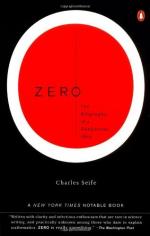
|
| Name: _________________________ | Period: ___________________ |
This test consists of 5 short answer questions, 10 short essay questions, and 1 (of 3) essay topics.
Short Answer Questions
1. According to the author in Chapter 2, “Nothing Comes of Nothing,” the Pythagorean view tied numbers to what?
2. Aristotle referred to Zeno of Elea as the inventor of what?
3. Ptolemy wrote what mathematical and astronomical treatise on the apparent motions of the stars and planetary paths?
4. The Gregorian calendar replaced what calendar system in 1582?
5. Who founded the House of Wisdom that was established in Abbasid-era Baghdad, Iraq?
Short Essay Questions
1. What mathematical properties of zero presented problems in the ancient world, according to the author in Chapter 1, “Nothing Doing”?
2. What discoveries did Archimedes make in the mathematical world?
3. How does the author describe Islam’s history in the seventh century in Chapter 3, “Nothing Ventured”?
4. What caused the USS Yorktown to have a computer meltdown in 1997, according to the author in Chapter 0, “Null and Void”? How is the ship described?
5. Where does the author claim zero was “born” in Chapter 1, “Nothing Doing”? How was zero involved in early mathematics?
6. What theory was developed through Blaise Pascal’s mathematical approach to theology?
7. How was zero dealt with in the Pythagorean view, according to the author in Chapter 2, “Nothing Comes of Nothing”?
8. What paradox of Zeno of Elea’s is presented by the author in Chapter 2, “Nothing Comes of Nothing”?
9. How did zero enter into Babylonian mathematics, according to the author in Chapter 1, “Nothing Doing”?
10. What advancements in mathematics were made by René Descartes?
Essay Topics
Write an essay for ONE of the following topics:
Essay Topic 1
Discuss the mathematical influences of Copernicus and Nicholas of Cusa during the Renaissance. How did Copernicus’s model of the universe differ from the Aristotelian model? What became of Copernicus and Nicholas of Cusa?
Essay Topic 2
Define and discuss imaginary numbers and their impact on algebra and mathematic philosophy. Who discovered imaginary numbers and when? How do imaginary numbers behave in comparison to real numbers?
Essay Topic 3
Describe and discuss the concept of the “limit” proposed by Jean Le Ron D'Alembert and its impact on calculus and mathematics. What impact did the discoveries of Jean Le Ron D'Alembert have on the concepts of zero and infinity?
|
This section contains 843 words (approx. 3 pages at 300 words per page) |

|




